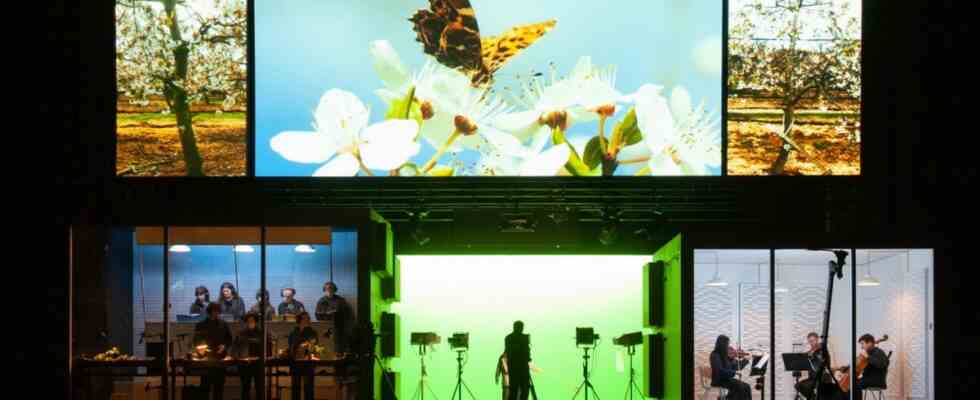It is not usual for a director to explain what she intends to do in the first minute of her production. Directors usually want their concepts to remain open to interpretation for a long time and only reveal a concrete message in a gently guided way. But Katie Mitchell doesn’t want to waste time puzzling over her stark warning about climate change. And every second of ambiguity is punishable. So she begins her performance of Chekhov’s “Cherry Orchard” with a clear warning on the huge billboard above the stage: “If we continue to mistreat nature, she will collapse, and we with her.”
As a result of this understandable impatience, the British director no longer has time for Chekhov over the next hundred minutes, neither for his plot nor for his subtly developing interpersonal dramaturgy. She doesn’t even have patience for single scenes, dialogues or even a touch of Russian poetry. The only thing Mitchell wants to focus on in her new production at the Deutsches Schauspielhaus in Hamburg is a nature documentary about life in a cherry tree plantation, albeit without a commentator as a silent film.
The actors are only allowed to utter decisive sentences for a few seconds
Crows, badgers, bumblebees, spiders, foxes, robins, starlings and hares, the whole Who’s Who of a European agricultural landscape is exhibited in quiet close-up and through the changing seasons to show what we lose if we continue to mistreat nature. This purpose makes up two-thirds of this staging, both in terms of time and content. The rest is the utilization of many talented actors as puppets of a director’s will. In two glass sound boxes on the left and right of a green screen studio, eleven ensemble members in black uniforms have to speak a classic version of Chekhov’s “Easy Reading” into studio microphones and create the rotating soundscape of a radio play, while in the right sound aquarium a string quartet creates impressionistic sound fields.
The text reciters, for whom Mitchell muted the sound most of the time, are only allowed to utter decisive sentences for a few seconds or switch to the live studio for microscenes, where they are then copied into the nature film for mostly very trivial gestures. This whole dry concept immediately develops the cold discipline of a Maoist obedient state, which could contain the only subtle message that Katie Mitchell dreams of an eco-dictatorship in which people only carry out a “good” will as a leader, without their own opinion and contradiction.
When the viewers have watched the very aesthetic animal documentary with its trace elements by Chekhov to the end, then Mitchell’s idea of theater as an imposed will to direct becomes really consistent. The chainsaws, which finally cut down the fruit trees in a close-up so that a lucrative holiday home settlement can be created by the river, stop and then the whole film, including its sparse game scenes, is transferred to rewind mode. Like raised monkeys, the people on stage have to repeat and play everything upside down, sometimes fast, sometimes slow-moving, while the film lets owls and bats fly backwards.
With all understanding: This form of ecological penal colony feels wrong
And because Katie Mitchell runs through this act completely humorlessly right from the start, the perhaps encouraging message that people can turn back the clock to correct the destructive mistakes in their lifestyle becomes outright torture for viewers. Like a pitiless teacher with a cane, the teacher of this world rescue school forces the unreasonable segment after segment again onto the retina, accompanied by a tonal cacophony of the incomprehensible and the shrill sounds of broken glass.
Even with the greatest understanding that disaster warnings are really annoying today because scientifically sound arguments are simply ignored, this form of ecological penal colony feels wrong and desperate. Especially when fire, flood and species death extremes are part of daily news consumption anyway, which makes Katie Mitchell’s demonstration didactics only part of a dystopian noise from which no proposed solutions resound. The lesson then is: educational communication must collapse if it abuses the goodwill of its addressees for its own dogmatism.

